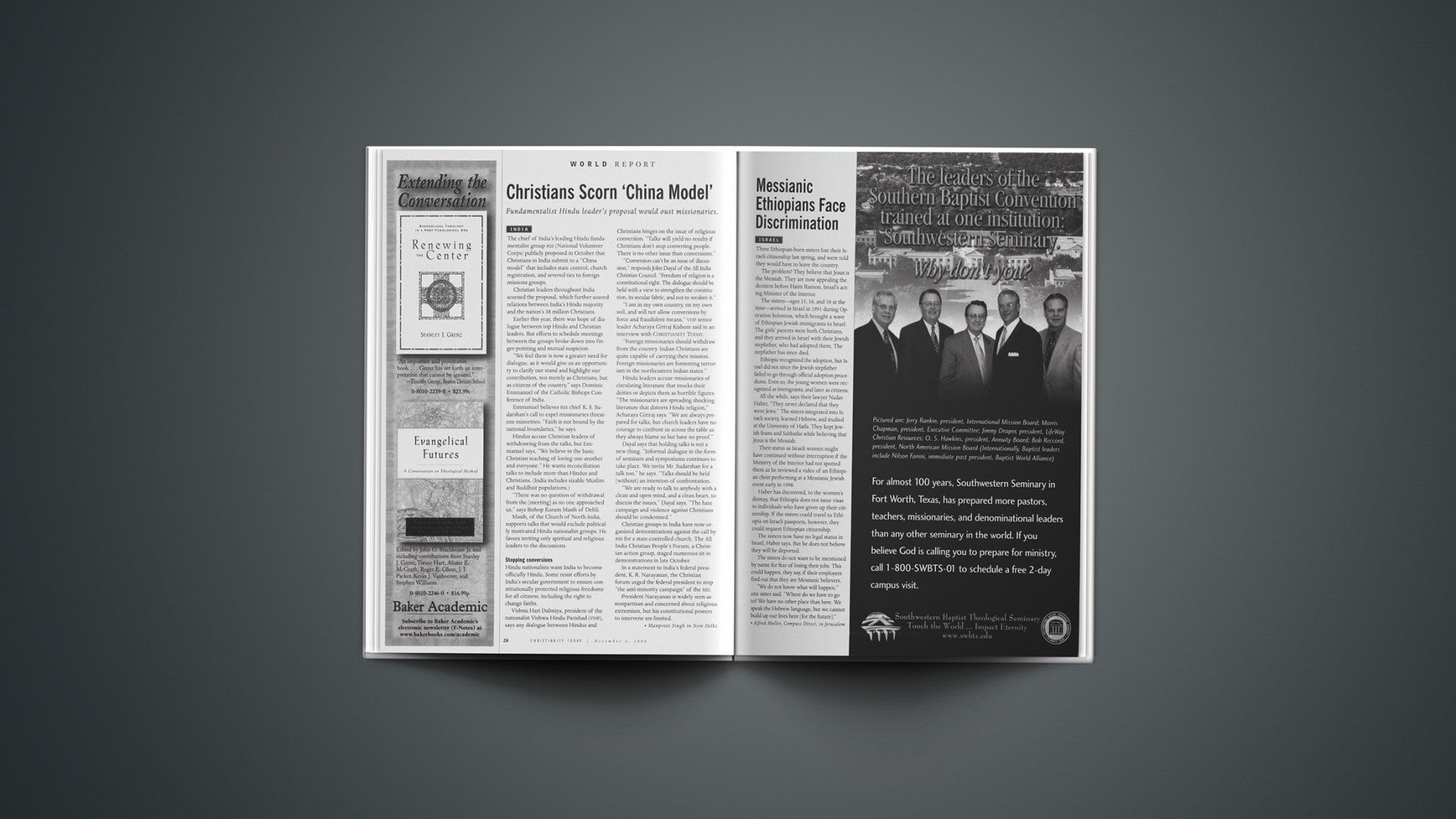Three Ethiopian-born sisters lost their Israeli citizenship last spring, and were told they would have to leave the country.
The problem? They believe that Jesus is the Messiah. They are now appealing the decision before Haim Ramon, Israel’s acting Minister of the Interior.
The sisters—ages 15, 16, and 18 at the time—arrived in Israel in 1991 during Operation Solomon, which brought a wave of Ethiopian Jewish immigrants to Israel. The girls’ parents were both Christians, and they arrived in Israel with their Jewish stepfather, who had adopted them. The stepfather has since died.
Ethiopia recognized the adoption, but Israel did not since the Jewish stepfather failed to go through official adoption procedures. Even so, the young women were recognized as immigrants, and later as citizens.
All the while, says their lawyer Nadav Haber, “They never declared that they were Jews.” The sisters integrated into Israeli society, learned Hebrew, and studied at the University of Haifa. They kept Jewish feasts and Sabbaths while believing that Jesus is the Messiah.
Their status as Israeli women might have continued without interruption if the Ministry of the Interior had not spotted them as he reviewed a video of an Ethiopian choir performing at a Messianic Jewish event early in 1998.
Haber has discovered, to the women’s dismay, that Ethiopia does not issue visas to individuals who have given up their citizenship. If the sisters could travel to Ethiopia on Israeli passports, however, they could request Ethiopian citizenship.
The sisters now have no legal status in Israel, Haber says. But he does not believe they will be deported.
The sisters do not want to be mentioned by name for fear of losing their jobs. This could happen, they say, if their employers find out that they are Messianic believers.
“We do not know what will happen,” one sister said. “Where do we have to go to? We have no other place than here. We speak the Hebrew language, but we cannot build up our lives here [for the future].”
Related Elsewhere
Read a story about Zeleka Yaeny, an Ethiopian immigrant to Israel drafted into the army, whose citizenship might also be revoked.
The U.S. State Department’s annual report on Israel’s religious freedom chronicles official and unofficial religious liberty abuses and concerns in that country.
AMF International also has a page specifically devoted to chronicling harassment of Messianic Jews.
For in-depth information about the secular and religious history of Ethiopia, visit africana.com.
Read Ethiopian church tradition about the first Ethiopian Christians, including this tale of two shipwrecked Syrian slaves and the young prince whom they served.
Other Christianity Today stories about Ethiopia include:
Meeting Noah’s Other Children | For years our congregation had done short-term missions projects. Then the Afar of Africa expanded our vision. (Aug. 7, 2000)
International Community Has No Excuses in Ethiopia, Says Aid Official | Starvation not widespread, but growing rapidly. (Jan. 18, 2000)
Guardians of the Lost Ark | Ethiopia’s Christians stake their identity on being heirs of Solomon and keepers of his treasure. (June 14, 1999)
Ethiopia Focus on Evangelism | Southern Baptists train for outreach in Addis Abbaba. (Feb. 8, 1999)
Centuries-old Treasures Pilfered | Priceless Artifacts are disappearing from Ethiopia’s churches and monasteries. (November 16, 1998)
Previous Christianity Today stories about Israel include:
How Evangelicals Became Israel’s Best Friend | (October 5, 1998)
Lutheran Bishop’s Appeal from Jerusalem | Religious leader’s letter requests prayer for Christians, Jews, and Palestinians in troubled region. (Nov. 10, 2000)
Latin Patriarch tells Israel to Surrender Lands to Palestinians | Catholic leader says Israel will never have peace unless it “converts all of its neighbors to friends.” (Nov. 1, 2000)
Fighting Engulfs a Christian Hospital in Jerusalem | Lutherans call conflict on their hospital grounds “an affront” to humanitarian purposes. (Oct. 16, 2000)
Preparing for Pilgrims | Religious rivalry complicates millennial planning. (June 14, 1999)
Copyright © 2000 Christianity Today. Click for reprint information.










